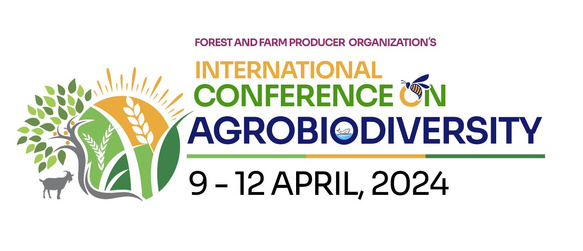Enriching nature and nutrition through agroecological knowledge, seed management, and climate-smart business and finance models
Realtime media coverage (available at the start of the conference)
Agriculture now covers the largest portion (46%) of the global land surface area; its ecological health and resilience in the face of changing climate are critical to human survival. The biodiversity found within agricultural and wild systems is what sustains us. But this agrobiodiversity is being rapidly eroded by a spiralling cycle of inequality driven by economic forces and power politics. Of 7000 plants historically cultivated for food, just three crops – rice, wheat and maize – make up 50% of global plant-based calories. This represents a formidable risk. Nature degradation and escalating climate risks pose significant challenges for frontline forest and farm producers. But they also pose a risk to future global supplies nutritious food, renewable energy, low-carbon construction materials, traditional medicines, organic cosmetics and ecosystem services like clean water, fertile soils, and flourishing ecosystems.
Organizations of smallholder farmers, Indigenous Peoples and Local Communities (IPs and LCs) maintain most of the world’s remaining agrobiodiversity. They do so by designing and adopting strategies and tactics that foster diversity through traditional diets and knowledge that underpins seed conservation, agroecological farming approaches, and enterprises targeting multiple markets. While their diverse landscapes are often more productive per unit area than large-scale industrial monocultures, these guardians of the world’s agrobiodiversity face significant challenges – not least in competing for resource rights, technical support and cost-competitiveness with large-scale industrial monocultures.
This conference will shed light on the challenges smallholder farmers, Indigenous Peoples and Local Communities face in managing the world’s agrobiodiversity. It will share best practices that can be pursued in policy, knowledge management, seed conservation, agronomy, enterprise development, and finance to sustain agrobiodiversity. It will also convene local to global alliances on agrobiodiversity to identify way of increasing investment into the forest and farm producer organizations (FFPOs) and IP and LC groups that sustain it.
Conference Objectives
The conference seeks to foster collaboration and knowledge-sharing among Forest and Farm Producers’ Organizations (FFPOs) and Indigenous Peoples and Local Communities (IPLCs) to advance agroecological practices, agrobiodiverse planting, and climate-smart business and finance models that enhance both nature and nutrition. The event aims to facilitate peer learning through South-South and triangular cooperation by bringing together representatives from FFPOs, IPLC groups, governments, civil society organizations, and global stakeholders.
With a focus on FFPOs from Asia, Africa, and Latin America, the conference aims to address common challenges in maintaining agrobiodiversity and adapt models to benefit members’ livelihoods. It also strives to strengthen collaboration between FFPOs and governmental institutions, the private sector, finance institutions, and other stakeholders to promote agrobiodiversity within forest and farm value chains. Lastly, the conference aims to create a knowledge base developed and owned by FFPOs, mainstreaming gender and youth concerns and incorporating indigenous and traditional knowledge into the discourse.
Conference Outcome
- Documented cases of good practices and tactics that sustain agrobiodiversity from FFPO and IPLC groups from which lessons can be learned
- Agreed actions to expand the co-production of knowledge on agrobiodiversity management in different contexts
- Agreed actions to promote the diversification of seed sources that sustain options for agrobiodiversity
- Agreed actions to pilot and upscale innovative business and financial models that incentivise agrobiodiversity conservation rather than diminish it.
Registration Link: Zoom Registration
For more information, visit, Agrobiodiversity Conference 2024

